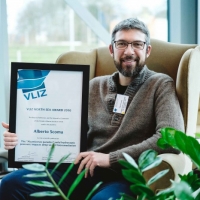High pressure research awarded
Dr. Alberto Scoma of the Center for Microbial Ecology and Technology (CMET, Faculty of Bioscience Engineering) received the 2016 VLIZ North Sea Award for his research on oil degradation at high pressure. Every year the Flanders Marine Institute (VLIZ) awards a prize at the VLIZ Marine Science Day to promote innovative fundamental or applied research. This research has to focus on the study of the structure or processes of our seas and ocean. The North Sea Award is awarded to a researcher (or research group) affiliated to a Belgian organization and amounts to € 1,000. The prize aims at rewarding recent and original scientific work relevant to the sustainable management of our seas and ocean. Dr. Scoma was awarded for his work entitled:
The “Alcanivorax paradox”: mild hydrostatic pressure impacts deep-sea oil bioremediation.
Following oil spills at sea, a group of specialized bacteria (known as hydrocarbonoclastic) is able to quickly grow using hydrocarbons as an energy source. One of the most representative hydrocarbonoclastic bacteria is Alcanivorax. The present work showed that a mild increase in hydrostatic pressure, simulating the conditions experienced underwater, remarkably reduces the capacity to grow and degrade hydrocarbons by Alcanivorax. This response to pressure resembles that occurred after the Deepwater Horizon spill in the Gulf of Mexico in 2010, where Alcanivorax and other hydrocarbonoclastic bacteria were not enriched at deep-sea pressure. Hence, the present work brings forward the hypothesis that hydrostatic pressure is critical factor in oil bioremediation. As the latter is the only (bio)technology we have today to clean up deep-sea oil contaminated environments, understanding how microbial communities respond to in situ conditions is relevant to assist policy markers to design efficient bioremediation protocols.
Alberto has worked as postdoctoral researcher at CMET for 3.5 years (Supervisor: Prof. dr. ir. Nico Boon). He is currently working at Aarhus University (Denmark) at the Center for Geomicrobiology on deep-sea biotechnology.


